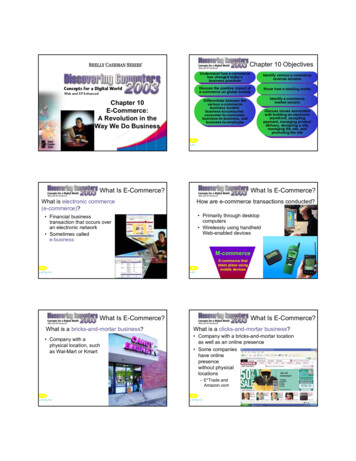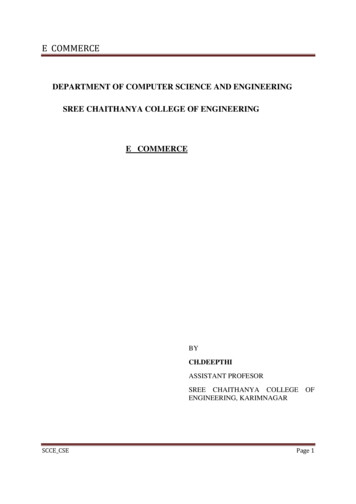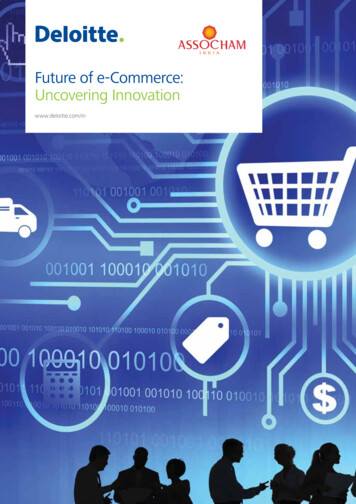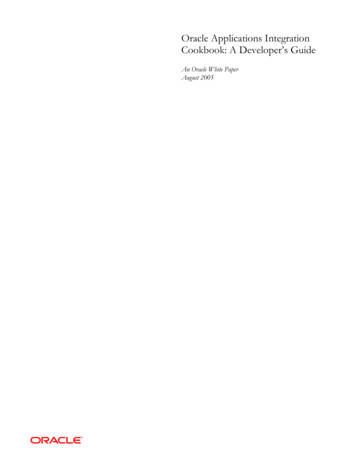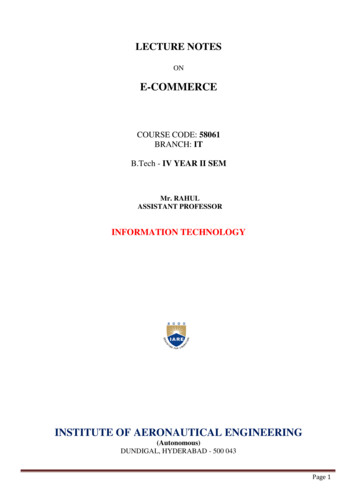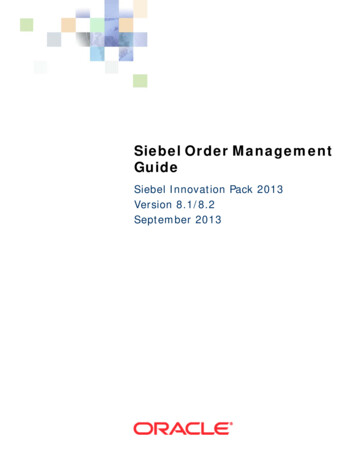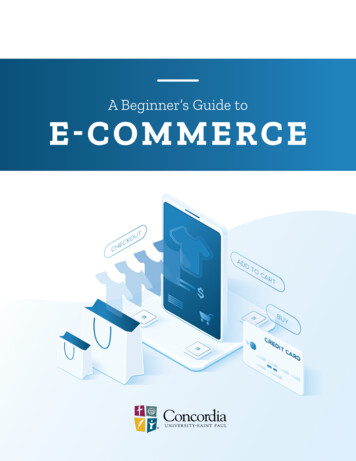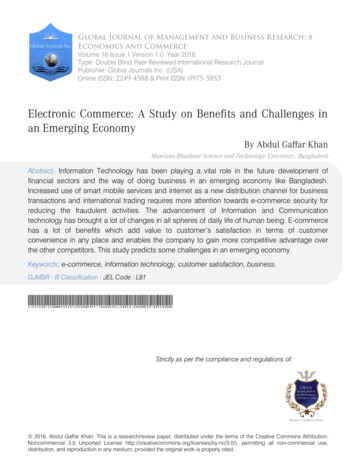
Transcription
Global Journal of Management and Business Research: BEconomics and CommerceVolume 16 Issue 1 Version 1.0 Year 2016Type: Double Blind Peer Reviewed International Research JournalPublisher: Global Journals Inc. (USA)Online ISSN: 2249-4588 & Print ISSN: 0975-5853Electronic Commerce: A Study on Benefits and Challenges inan Emerging EconomyBy Abdul Gaffar KhanMawlana Bhashani Science and Technology University, BangladeshAbstract- Information Technology has been playing a vital role in the future development offinancial sectors and the way of doing business in an emerging economy like Bangladesh.Increased use of smart mobile services and internet as a new distribution channel for businesstransactions and international trading requires more attention towards e-commerce security forreducing the fraudulent activities. The advancement of Information and Communicationtechnology has brought a lot of changes in all spheres of daily life of human being. E-commercehas a lot of benefits which add value to customer’s satisfaction in terms of customerconvenience in any place and enables the company to gain more competitive advantage overthe other competitors. This study predicts some challenges in an emerging economy.Keywords: e-commerce, information technology, customer satisfaction, business.GJMBR - B Classification : JEL Code : inanEmergingEconomyStrictly as per the compliance and regulations of: 2016. Abdul Gaffar Khan. This is a research/review paper, distributed under the terms of the Creative Commons AttributionNoncommercial 3.0 Unported License http://creativecommons.org/licenses/by-nc/3.0/), permitting all non-commercial use,distribution, and reproduction in any medium, provided the original work is properly cited.
Electronic Commerce: A Study on Benefits andChallenges in an Emerging EconomyKeywords: e-commerce, informationcustomer satisfaction, business.NI.technology,Introductionow-a-days e-commerce is growing popular in anemerging economy. E-commerce began in1995.It requires the digital goods for caring out theirtransactions. Digital goods are goods that can bedelivered over a digital network (Laudon and Laudon,2013). E-commerce is rapidly transforming the way inwhich enterprises are interacting among each other aswell as with consumers and Governments. As a result ofchanges in the landscape of ICTs, e-commerce is nowgrowing rapidly in several emerging markets anddeveloping economies (UNCTAD/IER/2015). Thetechnologies designed to improve commercialtransactions using the Internet have evolved as quickly.However, we have not yet achieved an ideal world ofpainless and secure transactions utilizing the Internet, asunresolved privacy issues of the purchaser haveimpeded the further development of the technologies(Alberto, Avila and violeta-2007). E-commerce has beenhailed by many as an opportunity for developingcountries to gain a stronger foothold in the multilateraltrading system. E-commerce has the ability to play aninstrumental role in helping developing economicsbenefit more from trade (WTO-2013). The growing useof the Internet, tablet devices, and smart phonescoupled with larger consumer confidence will see thatecommerce will continue to evolve and expand. Withsocial media growing exponentially in recent years, theconversation between businesses and consumers hasbecome more engaging, making it easier fortransactional exchanges to happen online. Internetretailers continue to strive to create better content and arealistic shopping experience with technologies likeaugmented reality. With mobile commerce gainingspeed, more users are purchasing from the palm of theirhand (Miva-2011). E-commerce could deliver asignificant benefit to businesses in developing countriesby increasing their control over its place in the supplychain, thus improving its market efficiency (Molla &Heeks, 2007).a) What is E-commerce?Electronic commerce, or e-commerce, is thebuying and selling of goods and services on theInternet. Other than buying and selling, many peopleuse Internet as a source of information to compareprices or look at the latest products on offer beforemaking a purchase online or at a traditional store. EBusiness is sometimes used as another term for thesame process. More often, though, it is used to define abroader process of how the Internet is changing the waycompanies do business, of the way they relate to theircustomers and suppliers, and of the way they thinkabout such functions as marketing and logistics. For thepurpose of this study e-commerce is taken to meandoing business electronically. (Lindsay P., 2002)b) Why E-commerce?With the increasing diffusion of ICTs, morespecifically the Internet, the global business communityis rapidly moving towards Business-to Business (B2B)e-Commerce. The buyers gain a clear advantage whenthe Internet gives them access to the global market, bywhich they can compare prices across regions, find outwhether prices vary by order fragmentation and getawareness about substitute products. Due totransparency of the market, customer can compare theservices of various e-commerce sites easily. For instant,in case of e-commerce the competitors are one clickaway from customer. If clients are not happy with theproducts, prices or services offered by a particular ecommerce site, they are able to changemuch moreeasily than in the physical. From the Sellers’ point ofview, they don’t need to have physical existence ofshop.Author: Department of Business Administration, Mawlana BhashaniScience and Technology University, Tangail, Bangladesh.e-mail: gaffar.mbaiu@gmail.com 20 16 Global Journals Inc. (US)Yearin the future development of financial sectors and the way ofdoing business in an emerging economy like Bangladesh.Increased use of smart mobile services and internet as a newdistribution channel for business transactions and internationaltrading requires more attention towards e-commerce securityfor reducing the fraudulent activities. The advancement ofInformation and Communication technology has brought a lotof changes in all spheres of daily life of human being. Ecommerce has a lot of benefits which add value to customer’ssatisfaction in terms of customer convenience in any placeand enables the company to gain more competitive advantageover the other competitors. This study predicts somechallenges in an emerging economy.19Global Journal of Management and Business Research ( B ) Volume XVI Issue I Version IAbstract- Information Technology has been playing a vital role2016Abdul Gaffar Khan
Electronic Commerce: A Study on Benefits and Challenges in an Emerging EconomyYear2016II.Global Journal of Management and Business Research ( B ) Volume XVI Issue I Version I20Review of LiteratureInternet and e-commerce are closely wrappedtowards developed countries. But they can achievetremendous benefits to developing countries if it isapplicable as an ideal business purpose. Ecommerce is a revolution in business practices(Ohidujjaman, et al 2013). The term commerce is viewedas transactions conducted between business partners.Electronic commerce is an emerging concept thatdescribes the process of buying and selling orexchanging of products, services and information viacomputer networks including internet (Anupam-2011).Commercial transactions involve the exchange of value(e.g., money) across organizational or boundaries inreturn for products and services. Exchange of value isimportant for understanding the limits of e-commerce.Without an exchange of value, no commerce occurs(Laudon and Traver). E-business has changedprocesses within and between enterprises. ElectronicData Interface (EDI), widely introduced twenty five yearsago on dedicated links between firms, showed howinformation could be directly passed from the operatingsystems of one enterprise into the order processing,production and logistics systems of another(Clayton andCriscuolo). If implemented properly, E-commercetechnologies can result in business processimprovements and increased efficiencies. Leveraging Ecommerce technologies should result in improvementsto developing countries, but so far have not producedthe desired results (Jeffrey S. Ray-2011). Thedevelopment experienced in internet and other globalonline networks have, thus, created new commercialopportunities for e–commerce and creation ofcompletely new sets of global and national tradingrelationships. This consequently, led to the perceptionthat e-banking and e-commerce are now an inevitableaspect of financial services. It enables multiple buyersand sellers to come together on a common platform andconduct business without compromising individualrequirements and relationships among the participantsvery quickly; (Harris and Spencer, 2002; Bairagi, 2011).Electronic commerce is creating new opportunities tothe global economic, for example in global al business method to electronic commercemethod is hard and there were many different factors forcompanies to adapt them with electronic commercefactors (Nanehkaran, 2013). (Hasan, 2010) pointed outthat nowadays e-commerce industries have increasinglybecome a necessary component of business strategyand a strong catalyst for economic development.III.Objectives of the StudyThe main objectives of the study are as follows:1. To get a full acquaintance of the E-commerce inBangladesh. 20161 Global Journals Inc. (US)2. To identify the benefits of E-commerce.3. To know the challenges in E-commerce.IV.Research MethodologyThe paper has been written on the basis ofsecondary data. The secondary data were collectedfrom published books, journals, research papers,magazines, daily newspaper, internet and officialstatistical documents. The study is qualitative in nature.V. E-commerce Situation in BangladeshIn Bangladesh, there is a great deal of interestin e-commerce; however, due to various economic,infrastructural and legal reasons it did not spread widelyin the past. After the introduction of 3G technology, thee-commerce has been growing rapidly because peoplehave more easy access to internet than in the past.According to BASIS (Bangladesh Association ofSoftware and Information Services), in just threeyears, more than 2000 online trading platforms havemade their way to Bangladesh. Business people andtrading houses state that the rapid growth in internetnetworking and mobile phone coverage induces themto meet customers online and deliver a smooth andtransparent shopping experience including e-ticket salesand sales on Facebook the market hasyearlytransactions around Tk 10 billion (approximately DKK700 million). Furthermore, it increases at a tremendouspace with a monthly growth of 20-25 percent accordingto data from BASIS. Around 15 million people use theinternet regularly of them,4-5 million have accountson Facebook which is still holding the leadingposition for online shopping through smaller and morelocal businesses although the market is changingrapidly. Larger companies, domestic and international,are having success in transforming a somehow hecticshopping culture into a transparent and easy wayof accessing a greats e-location of consumer goods.This trend is known to Swedish e-commercecompany Bikroy.com who is doing well in Bangladesh.Since their launching in 2012 Bikroy.com hasexperienced a significant growth and is today the largestonline marketplace in Bangladesh. Now they have morethan 2 million unique visitors on their website.VI.Benefits of E-commerceThe main benefit from the customers’ point ofview is significant increase and saves of time and easesaccess from anywhere in the globe. Customer can placea purchase order at any time. The main benefits of ecommerce for customers are as follows: Reduced transaction costs for participatingexchange in a market. Increased comfort - transactions can be made 24hours a day, without requiring the physicalinteraction with the business organization.
VII.Challenges in E-commerceThe major challenges faced by the sellers andthe buyer which carrying out business transactionsthrough internet are as follows. Private and public corporation is not involved jointlyto grow the business of e-commerce. Private andpublic joint initiative is needed to develop the ecommerce business. Joint initiatives bring credibilityinside people, which is needed for flourishing the ecommerce business. There is a lack of system security, reliability,standards, and some communication protocol.Customer loses their money if the website of ecommerce site is hacked. Most common problem ofe-commerce website is not having enough cybersecurity. Financial institutions and intermediaries: Thus far,financial institutions and banks in developingcountries are hesitant to take an active role inpromoting e-commerce. However, merchants needthe involvement of banks to broaden the reach andappeal of ecommerce and to help prevent fraud andpotential losses attributable to credit card fraud. Butbeyond the credit card approach, banks and otherfinancial service intermediaries are challenged todevelop alternative modalities for secure andreliable online transactions in environments wherecredit cards are not commonplace (Anupam-2011). In developing countries there is a culture of buyingproduct by negotiating price with seller, which is noteasily possible in case of e-commerce indeveloping countries because of lack ofinfrastructure facility. One of the biggest challenges is the cutting downthe price of internet. Authorities are trying to keeplow the price of bandwidth low. But the high cost ofspreading networks and operating expenses hinderto keep price low for internet. Trust is the most important factor for the use of theelectronic settlements. Traditional paper aboutbased rules and regulations may createuncertainties the validity and legality of e-commercetransactions. Modern laws adopted and impartialityimplemented in the electronic transactions form thebasis of trust in the developed world. Where legaland judicial systems are not developed ecommerce based transactions are at adisadvantage because of lack of security whetherreal or perceived. In many developing countrieseven today cash on delivery is the most acceptedsystem, even cheques and credit cards are notreadily accepted (Roni Bhowmik-2012). New methods for conducting transactions, newinstruments, and new service providers will requirelegal definition, recognition, and permission. Forexample, it will be essential to define an electronicsignature and give it the same legal status as thehandwritten signature. Existing legal definitions andpermissions such as the legal definition of a bankand the concept of a national border—will also needto be rethought (chavan-2013).Besides the above challenges, the emergingeconomy like Bangladesh also faced the followingchallenges: Lack of education Cultural tradition Poor concept of online marketing Less marketing or promote Political problem High cost of products/services comparing traditionalmarket Internet coverage arena is limited Communication is haphazard over the country Lack of trustable business and enterprise and Lack of experience of meeting directly withmerchant and customer. 20 16 Global Journals Inc. (US)YearTime saving- Customer can buy or sell any productat any time with the help of internet. Quick and continuous access to informationCustomer will have easier to access informationcheck on different websites at the click of a button. Convenience-All the purchases and sales can beperformed from the comfort sitting a home orworking place or from the place a customer wantsto. Switch to others companies-Customer can easilychange the company at any time if the service of acompany is not satisfactory. Customer can buy a product which is not availablein the local or national market, which gives customera wider range of access to product than before. A customer can put review comments about aproduct and can see what others are buying or seethe review comments of other customers beforemaking a final buy.The main benefits of e-commerce from sellers’point of view is increasing revenue and reducingoperation and maintenance costs through internet.These include as follows: Increases revenue. Reduces operation and maintenance costs. Reduces purchase and procurement costs. Raises customer loyalty and retention. Reduces transportation costs. Develops customer and supplier relationships. Improves speed of the process of selling. Improves internal and external communication. and Develops the company image and brand.21Global Journal of Management and Business Research ( B ) Volume XVI Issue I Version I 2016Electronic Commerce: A Study on Benefits and Challenges in an Emerging Economy
Electronic Commerce: A Study on Benefits and Challenges in an Emerging EconomyYear2016VIII.Global Journal of Management and Business Research ( B ) Volume XVI Issue I Version I22ConclusionsThe e-commerce industry will be a leader withpopularity in electronic business world in the upcomingyears. The e-commerce revolution has fundamentallychanged the business of transaction by giving newopportunities and breaking borders easily. InBangladesh, it has strongly impacted the traditionalbusiness system and changing the life of people bymaking it easier. While it gives benefits to customer andseller, e-commerce gives challenges to traditionalbusiness for competitive position. Developing countriesface many obstacles that affect the successfulimplementation of e-commerce with the help ofcomparing with developed country. When the internetcost will be low then the e-commerce will flourish easilyand will make many of traditional business to run out oftheir business. Convenience is one of the benefits thatcustomer gets from the e-commerce and thusincreasing customer satisfaction. This is due tocustomer can place a purchase an order from anywherewith internet connection. E-commerce business providershould give importance on every customer by givingsmooth service and many options for payment and havemore functions available online. Other benefits areexpanded product offerings and expanded geographicreach. But e-commerce business faces a lot ofchallenges in flourishing their business.References Références Referencias1. Almeida, G. A. A. et al (2007). Promoting ECommerce in Developing Countries. www.diplomacy.edu.2. Bairagi, A. K. (2011). “Utilization of E-Commercecan Change the Auction Culture of BangladeshSpecially in Public Sector”. IJCIT, Vol. 2(1), pp. 5561.3. BangladeshAssociationofSoftwareandInformation Services. http://www.basis.org.bd/.4. Bhowmik, R. (2012). “The Present E-CommerceSituation In Bangladesh For B2c E-Commerce”.International Journal of Economic Research, Vol.3(5), pp.77-91.5. Chavan, J. (2013). “Internet Banking- Benefits andChallenges in an Emerging Economy”. InternationalJournal of Research in Business Management, Vol.1(1), pp. 19-26.6. Clayton, T. et al (2002). Electronic Commerce andBusiness Change.7. Embassy of Denmark in Bangladesh: The TradeCouncil (2014): ICT and commerce booming inBangladesh.8. Hasan, A.H.M., Saidul. et al (2010). “Adoption of Ebanking in Bangladesh: An exploratory study.”African Journal of Business Management, Vol.4(13), pp. 2718-2727. 20161 Global Journals Inc. (US)9. Harris, L. and Spence, L. J. (2002). “The ethics ofBanking”. Journal of Electronic CommerceResearch, Vol. 3(2).10. Laudon, K. C., and Laudon, J. P. (2013).Management Information Systems: Managing theDigital Firm. Twelve Edition. Pearson. Delhi.11. Laudon, K. C., and Traver, C.G. Introduction to Ecommerce: business. technology. society. FifthEdition.12. Miva, M. and Miva, B. (2011). The History ofEcommerce: How Did It All Begin?. how -didit-all-begin.13. Molla, A., and Heeks, R. (2007). “Exploring Ecommerce benefits for businesses in a developingcountry”. The Information Society.14. Nanehkaran, Y. A. (2013). “An Introduction toElectronic Commerce”. International Journal ofScientific & Technology Research, Vol. 2(4), pp.190193.15. Ohidujjaman,etal(2013).“E-commerceChallenges, Solutions and Effectiveness PerspectiveBangladesh”. International Journal of ComputerApplications, Vol. 70(9). pp. 9-17.16. Ray, J. S. (2011). “Leveling E-CommerceOpportunities for Developing Countries”. SMCUniversity.SwissManagementCentre,Transknowlogy Campus.17. UNCTAD (2015). Information economy report 2005:Unlocking the Potentials of e-commerce fordeveloping countries. United Nations Publication.18. World Trade Organization. “E-commerce indeveloping countries: Opportunities and challengesfor small and medium-sized enterprises”.
online networks have, thus, created new commercial opportunities for e–commerce and creation of completely new sets of global and national trading relationships. This consequently, led to the perception that e-banking and e-commerce are now an inevitable

